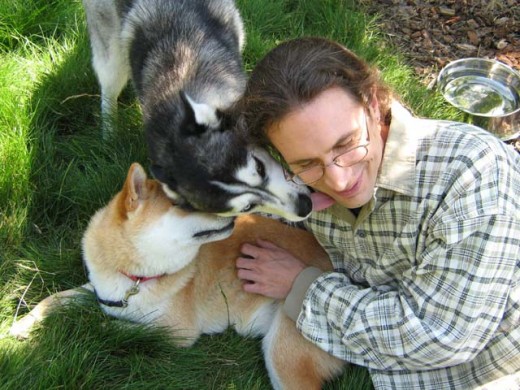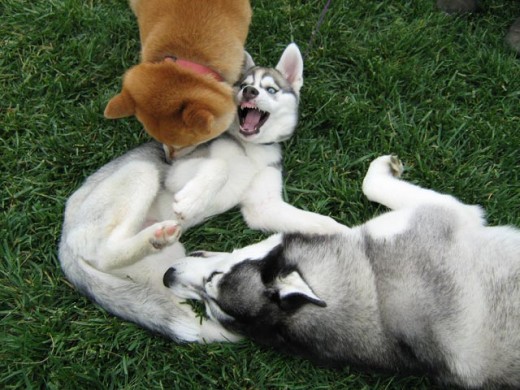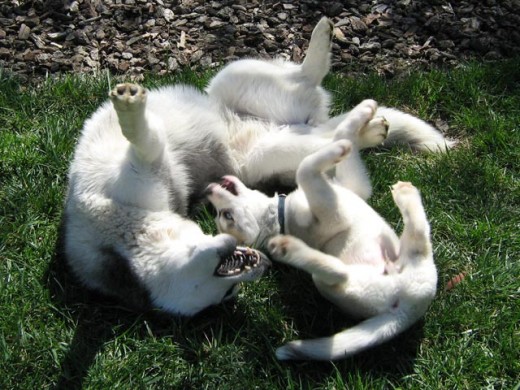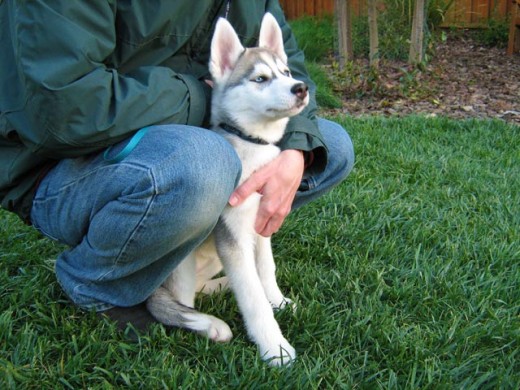My trainer said something interesting the other day. She claimed that dog-to-dog socialization is mostly for us humans; so we can conveniently take our dog with us everywhere.
Dogs according to her, really need to socialize with their people, but are perfectly happy with or without other dogs around. She said that dogs are happier curled up in bed with us, with a piece of steak, than they are socializing with their dog friends.

When we watch puppies at play, it is easy to believe that dogs really do need interaction with other dogs. They are so exuberant in their play, they have so much fun with each other, and then they just plop down in a puppy heap and fall asleep.
How can a human compete with that, much less replace it?
Here we consider what do dogs need, from a social perspective.

Dogs Need People

Dogs really need quality time with their people.
- Certain dogs, like my Shiba Inu, need to be with people that they have bonded with,
- While others, like my Siberian Husky, are happy as long as there are people around to interact with.
It is important to spend some quality time with our dog every day. Play time, obedience training, and daily walks, are all important, and will help establish trust, respect, and a lifetime bond.
We also need to be a good pack leader, and teach our dog the proper rules of behavior in a human world. This can be done by following the Nothing in Life is Free (NILIF) program, and using reward obedience training.

Dogs Need Socialization


Dogs may not need other dogs, but general socialization is extremely important.
Because our dogs live in a human world, it is important to expose them to a variety of environments, dogs, people, and weird objects (e.g. umbrella, balloons, garbage truck); in a positive way.
Young dogs learn faster, are more curious, impressionable, and eager to please. Therefore, I start dog socialization exercises early-on, when I first get a new dog. I carefully manage my dog, and make sure not to expose him to more than he can handle. Note that young dogs go through certain critical fear periods, where they are more susceptible to new external stimuli, so I am especially careful during those times.
I always start small and slowly build-up the social challenge, so that my dog will enjoy the encounter, and be successful at it. Success builds confidence, and breeds more success. Negative experiences, on the other hand, causes a dog to become fearful and uncertain. If a dog is fearful of people or objects, be sure to desensitize him to the problem stimulus slowly.
Remember that socialization is not only about the quantity of new experiences, but also about the quality of those experiences.
A well-socialized dog, that is confident and comfortable with his surroundings, is a joy to have around, and can follow us everywhere. He is less likely to misbehave or use aggression, even in stressful and unexpected situations. Instead, he trusts us to handle things, and is a happier and more balanced dog as a result.

Dogs Need Our Protection
Do not expect a dog to like socializing with all other dogs.
Many dog movies and television shows present an unrealistic image of the dog.
- He is naturally obedient and loyal,
- Magically understands verbal commands in at least 5 different languages, and
- Loves all people and animals (except for the bad guys).
The truth though, is that most dogs are not Lassie, and will not enjoy the company of all people or all dogs.
In He Just Wants to Say Hi, Suzanne Clothier illustrates how dogs have social boundaries, just as we do. We do not allow strangers to come up to us, invade our space, and physically man-handle us. We should not allow strangers to do that to our dogs either, especially if he dislikes having his space violated.
Always observe and listen to what our dog is trying to say. Understand his social boundaries, and protect him from rude dogs as well as rude people.
When adding a second dog to the family, it is best to introduce our existing pack to the new dog on neutral territory (e.g. a quiet park, empty parking lot). See if the new dog is accepted, and assess his temperament to determine how he may alter pack dynamics.
Opening our home to a new puppy or new dog, especially a shelter dog, is an awesome thing to do. However, I believe that the addition should not be made at the expense of our existing dogs.

Age, bad experiences, as well as physical health issues may change our dog’s social tolerance.
Puppies need to be with their mother and litter-mates until they are about 8 weeks old. Playing and interacting with his brothers and sisters, will help a puppy learn social manners, bite inhibition, and other useful skills. A puppy’s mother and adult relatives, also help to set consistent rules and boundaries for him, at an early age.
As a puppy matures, he becomes more independent, and has a lesser need for other dogs. In fact, if not properly socialized, he may become fearful and cautious. Depending on breed, some dogs may also develop stricter social boundaries, and may not want unknown dogs or people crowding their space, touching them, or sniffing their butt.
It is important to ensure that our dog’s interactions with other dogs are not negative. Too many negative experiences may cause him to become fearful and aggressive toward other dogs.

My Shiba Inu does not have very good dog greeting manners. He is a very in your face dog, and regularly annoys other dogs by invading their space without permission. I manage him very carefully, and when we see other dogs, we just calmly move on.
In this way, he is learning avoidance and building up many neutral dog-to-dog experiences. Doing desensitization training with balanced, well-socialized dogs, can also help improve a dog’s greeting skills.

Note that health and physical issues may also affect a dog’s social behavior and social comfort level.
I have a three-legged Siberian Husky who is friendly, but cautious with other dogs. Three legged dogs, seniors, and dogs with joint pain or other physical illness, will naturally feel more vulnerable. As such, they may perceive most things as threats, and may respond with aggression to protect themselves, especially when they feel cornered.
It is crucial not to expose such dogs to overly stressful situations, and to always protect them from unwanted attention (dog and human).

Dogs Need Companionship
Dogs may not need to socialize with other dogs, but if they can have a friendly dog companion, so much the better.

One of the best things we can get for our dog, is another compatible dog to play with.
My Shiba Inu loves wrestling and chasing, and it is just not possible for us humans to truly play dog. We cannot run very fast, and our wrestling skills are very limited compared to theirs.
In addition, it is generally not a good idea to wrestle and play rough with a dog. This may encourage him to start playing rough with other people, including children, seniors, or even adults that are fearful of dogs.
Unless we have great off-leash control over our dog, it is safer to institute the “no wrestling with people” rule, at all times.



I got a Siberian Husky puppy, after my Shiba Inu reached his first birthday. I waited 1 year before getting a second dog, because I wanted some alone time to bond with my Shiba.
If we get two puppies together, they may just bond with each other, and never truly warm up to human company. If we wait too long to get a second dog, our existing dog may get too set in his ways, and may not like to share with a new canine companion.
I chose a Siberian Husky because they are active dogs that like chasing and wrestling, just like my Shiba. Certain breeds may prefer retrieving balls or herding, so it is important to evaluate our dog, and pick a breed that is compatible with his play style and interests.
We can also –
- Organize small playgroups with friendly neighborhood dogs,
- Find a good dog daycare, or
- Hire a dog walker to take our dog on group walks at the park.
Enclosed dog parks are a risky alternative, because the environment is often unstructured, over-stimulating, and lacking in proper human supervision.

Do Dogs Really Need Other Dogs?
The dictionary definition of need, in this context, is to
require (something) because it is essential or very important
~~[Oxford American English Dictionary]
- I think that our dogs really need their people, but they do not really need the company of other dogs. Many dogs live perfectly happy lives, being an only child in the family.
- I think that general socialization, including dog-to-dog socialization (i.e. helping our dog be comfortable in the presence of other dogs), is important for us and our dogs. It will allow us greater flexibility and enrich our time together.
- I think that just like people, different dogs have different temperaments and social preferences. Some dogs are more dog-social, some dogs are more dog-tolerant, some dogs prefer the company of people, and some dogs prefer their own company. Social preferences and tolerances may also change based on mood, past experiences, health, and more.
- I think all of my dogs would prioritize steak, above most other things, most of the time. 😀 People with food probably comes next, and then other dogs.
- I think that my trainer’s “steak statement” is mostly accurate, i.e., it is probably true for many dogs, most of the time. This does not mean that my dogs do not enjoy interacting with other dogs, only that they prefer a juicy steak more!
What do you think? Do dogs need other dogs? In particular, is the company of other dogs essential to our dog’s life, or can they lead perfectly happy lives with just the company of people.
In the space of one year i..my 17 year old cat was euthanased..one month later my husband died..8 months later I had to euthanase my beautiful 12 year old hound x beagle…I work full time..my kids live interstate..my 7 year old furry dog Twister is now alone..our cat was like her mum..I adopted a dog from the Dogs Home and had to return it one week later..my heart broken in tears at the home office…long story … am soo unsure as to whether to get another dog…..I walk my dog 1 hour EVERY MORNING x 7 days a week..she has 3 x walks afternoons by dog walker..I walk her the other 4 afternoons..she if perfect off lead..what should I do? we have a VERY CLOSE BOND following our losses………can someone please advise. I live next to a nature reserve so she is not ‘isolated’ plus she loves to chase the cockatoos away from their feeding dish on the veranda..I think she used to work with a Tradesman..hence the excellent off lead and obedience…… thank you for any advice ….
I Have an Akita inu, she is 6 years old now, and we just found out that she has bone cancer. She never liked other dogs, but she LOVES cats, we have 3 cats that she adopted as her babies and they are really helping her to recover. Her oldest cat Delay sleeps with her and it is always near playing or doing something to keep her happy!
I found your site looking for tips about how to take care of a 3 leg dog, as she just lost one now, and it is being amazing for me, thank you for all the love and care you give to your babies and the hope you give for us!
My year and a half old Shiba/Akita (65 lbs) loves cats and dogs and babies and kids and pretty much all animals. But he thinks he is a cat. His household (before mine) included a litter of kittens. He bonded with one, and they slept together and groomed each other as if siblings. I’ve considered going to the pound and letting him pick out a cat. I think your addition of cats for your recovering dog is ideal, it’s constant support and companionship for your dog. Maybe love of felines is an Akita trait.
Hi
Can I just ask does your 3 legged Husky need as long a walks as a 4 legged one? I’m assuming with it being a front leg too and 1 leg carrying most of his body weight he/she would tire quickly hopping about?
I have a two year old vizsla stud who has been an ‘only dog’ since last October. He’s a giant momma’s boy and loves having unrestricted and uninterrupted time with his person. By the same token I remember him happily crating up with my older dog, they’d cuddle in their shared crate together all the time.
I do strongly believe that needing another dog in the house is at least partly breed related, where some dogs (like shiba and huskies and malamutes, ancient breeds) are less likely to need doggy buddies than dogs like the vizsla. Sporting breeds, and especially vizslak, were bred to work closely with people and NEED companionship. They’re also among the more athletic and insane breeds when it comes to play time, and to be frank I’m just not fast or looney enough for him when it comes to wrestling time. They tend to clump together, it’s not at all unusual to find a pile of red dogs on whatever furniture they choose to use. 🙂
Hello!
I’m a little worried because I’ve had my husky puppy Dexter since he was 8 weeks. Due to health reasons I am living with my parents and their two dogs, and have been since I’ve gotten him. Dexter is almost 5 months now, and I’ll be moving back to college soon and taking him with me. He has obviously bonded to me more than any other human – I feed him, take him out, trained him, take him on trips just the two of us, he sleeps in my room, so I’m pretty positive he knows he’s MY dog. However he’s also bonded with my parents’ other two dogs and isn’t used to being without the company of other dogs around. I’m really worried about this transition for him… any tips on what to do (besides get another dog haha) once I move away with him and its just the two of us??
Can you bring him back home for visits?
Try to bring him back home for visits if you can.
Introduce him to some new friends as well
Hi my parents own an 8yr old male husky.
They seem to think he NEEDS a companion.
They have only had him for just under a year because his owners moved abroad.
My parents live in a bungalow but have a large garden.
I dont think he wants to share his home as when I visit with my 2yr old Staff female who is very subservient he growls in a way that terrifies her she wont walk past him without assistance & this is exact reason he didnt stay living in my home with my family.
I had initially taken him in believing my fur girl wanted some company.
He dominated her in such a way that she changed & it wasnt fair on either of them as he seemed intolerant of her & my lovely friendly well socialised dog had become a shrunken violet.
My parents fell in love with him & decided to take him into their home but now after 9mths seem to think that it would be best for him to have a 6mth old female brought into the home to keep him happy to be his little play mate.
He is walked daily & enjoys socialising with the dogs in the park.
I have told them I dont agree he wants or needs a canine companion.
He was bred for the first three years of his life on a puppy farm, he was purchased from the farm to live aged 3 with an old female mixed breed dog that he dominated.
Should they be considering bringing another dog into his life on a permanent basis ?
I just need a honest answer from people that understand the breed.
Thank you in advance for any answers.